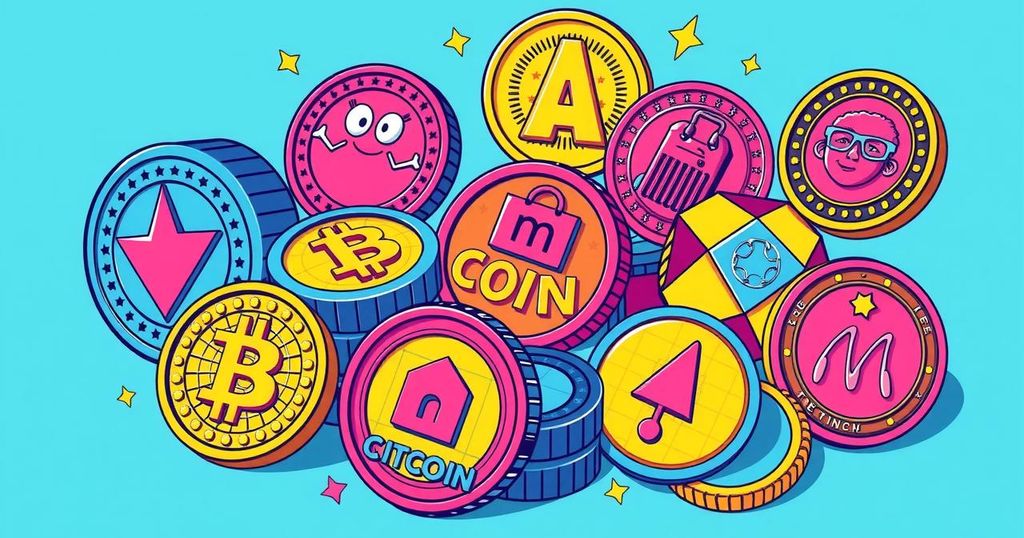Meme Coins: Young Investors’ Bold Bet on the American Dream
Young investors, including Yuvia Mendoza, are turning to meme coins as a risky but enticing avenue to wealth and the American Dream. With traditional paths to economic stability like home ownership slipping away, many like Mendoza feel the need to explore crypto. While the market is volatile and rife with scams, some see it as their best chance.
In Denver, a new trend is emerging among young crypto investors, with meme coins capturing their imagination as a pathway to the American Dream. Take Yuvia Mendoza, for example. Recently, she offered a Hooters server $1,000 in cryptocurrency just to snag a staff T-shirt. Mendoza, at 25, earns a six-figure salary in community growth for crypto projects, yet the financial strain of the Bay Area looms large over her. With housing affordability slipping away, she and many others like her are turning to high-risk investments like meme coins.
The allure of meme coins lies in their quirky origins, often sparked by internet jokes. Despite the risks—wild price fluctuations, rampant scams, and the need for constant attention to market trends—investors feel drawn to them. Economists argue that this reflects a form of “financial nihilism,” especially among Gen Z, who are burdened with student debt and often find themselves stuck living with their parents.
Joe McCann, head of Asymmetric, a crypto hedge fund, comments that young people are increasingly opting to take a gamble on meme coins instead of traditional investments like a 401(k). This generation sees few paths to financial stability, prompting them to place their bets on the unpredictable world of cryptocurrency. The narrative of what the American Dream means is shifting, according to 27-year-old Veronica Sutton, who dropped out of college due to the costs of attending during the pandemic. Sutton’s foray into bitcoin started when her fiancé gifted her some two years ago.
Her fiancé, George Heiman, has also ventured into the world of crypto since 2017, viewing it as a way to step outside a financial system he believes is rigged. Despite some losses, he asserts that trading digital assets has yielded better returns than most conventional jobs. Now, the couple is banking on crypto to secure a down payment for a home this year, reflecting a significant shift in generational wealth strategies.
Meanwhile, the political landscape has also played a role in the meme coin phenomenon. Some attendees at a recent conference expressed hope for a crypto-friendly environment during President Donald Trump’s administration. Trump’s support for meme coins, including promotional efforts for $TRUMP and $MELANIA, has raised eyebrows about potential conflicts of interest, especially as the SEC has classified meme coins as collectibles rather than securities.
Elon Musk remains a prominent figure in this narrative, notably with his DOGE Service, a nod to dogecoin, the first meme coin. As meme coins gain traction, David Krause from Marquette University warns potential investors to do their homework. Understanding the intentions and technologies behind these currencies is critical, given that younger generations are increasingly drawn to speculative investments.
A Pew Research study revealed that 42% of men and 17% of women aged 18 to 29 have dabbled in crypto, a significant increase compared to older demographics. The recent growth of online betting and the GameStop frenzy has further emboldened this younger crowd to engage in financial risks online. Mendoza and others are inspired by figures like “Roaring Kitty,” known for his GameStop triumph, looking for their own luck in meme coins.
To navigate this high-stakes market, many spend significant hours online monitoring trends, with individuals like Jeff Matthews clocking in 14 to 17 hours daily to chase digital profits. But the ride can be bumpy; Matthews recently watched an investment in a new meme coin plummet, turning a promising stake into mere pocket change.
Some crypto firms are developing ways to mitigate the risks inherent in meme coins, suggesting that a diversified approach may offer a more sensible method of investment. Vitalik Buterin, co-founder of Ethereum, sees meme coins as potential tools for community-building rather than just financial assets. He has used his own proceeds to support charitable causes, underlining that with the right approach, these coins can serve a positive purpose.
As for Mendoza’s efforts, her Hooters-themed coin hasn’t exactly shot to the moon, seeing a significant drop in market cap. However, she isn’t deterred. Now, she’s eyeing another meme coin, HOUSECOIN, with aspirations its value could one day stretch far enough to purchase a home. “There’s a million dollars in your computer — you just need to figure out the right button to press,” Mendoza quips, embodying the optimism of this wave of young, tech-savvy investors.




Post Comment